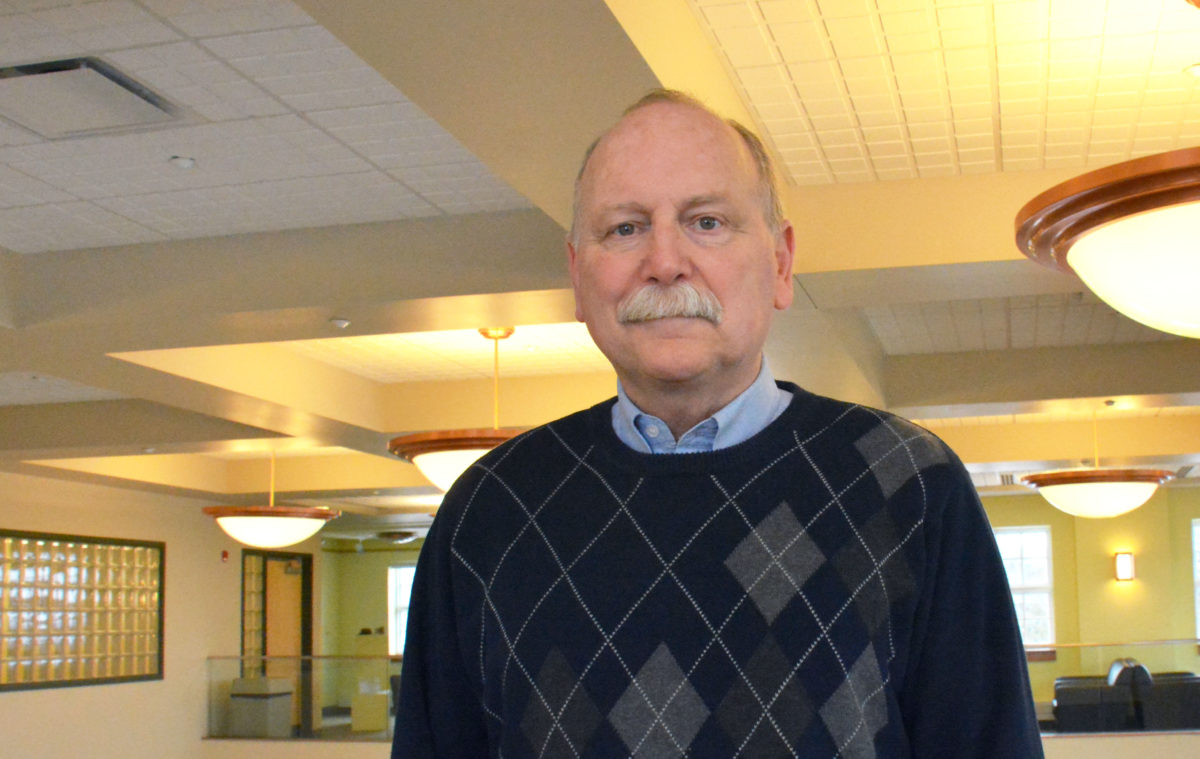I remember the first class I took with Patrick Malcolmson at St. Thomas University.
The political science professor stood at the front of the classroom, a friendly smile beneath his white mustache. He was dressed in one of his iconic button-up dress shirt and tan dress pants combinations.
I don’t remember exactly what he said on that particular day nearly four years ago, but I’m sure he made his regular propositions: “Intelligent people disagree” and “humans are political animals and you can’t understand them unless you understand politics.” Those sayings would become a staple of my academic career the more classes I took with Malcolmson, and I’ll never forget them.
Malcolmson, 65, is retiring after teaching at St. Thomas for 29 years. During his time at the university he’s chaired five departments, been vice-president academic, inspired students to become professors and changed the way hundreds of students think.
He said he’s been fortunate to work with the colleagues he’s had during the last 30 years at St. Thomas.
“Ones I disagree with, and quite profoundly disagree with, I’m still quite good friends with and colleagues with,” Malcolmson said.
“That just seems to me to be the model of what a university supposed to be like. Because in the end, your real interest is in the project of education and in the students, not your disagreements with each other.”
Parting words
Malcolmson grew up in Fort Saskatchewan, Alta., about 30 kilometres east of Edmonton.
He studied at the University of Alberta.
“[It] never crossed my mind to go anywhere else. I didn’t even know there were universities in other cities.”
He started studying chemistry, but switched to political science after taking a course and falling in love with the subject.
“My parents had the reaction that you might imagine, you know, ‘Why on Earth would you do that?’”
Malcolmson started teaching at STU in 1990. He came to STU after teaching political science at his alma mater.
During his last 29 years at St. Thomas, he’s seen enrolment at the university increase and he’s seen the addition of new departments, including human rights, fine arts and science and technology studies.
He hopes the university maintains its focus on liberal arts education.
“The idea of a liberal [arts] education is to acquaint students or teach them from a number of different perspectives, and then let them make up their own minds and encourage them to make up their own minds.”
Malcolmson has three reasons for retiring now. He wants to spend more time working on his four book projects, including a book about Shakespeare and politics and a new edition of The Canadian Regime, a book he co-authored about Canada’s political system.
Malcolmson also said he wants to retire before has to.
“Students and faculty members have said, ‘You shouldn’t retire, you’re doing a great job.’ But I think that’s the time to retire. You should go before you have to go. Before you feel like, ‘Yeah, I better quit because I’m no longer really as good as I used to be’ or something.”
He also wants to make room in the workforce for a younger professor to advance in their career.
“It’s time for me to get out of the way and let somebody else have a job,” he said, adding that a new, younger hire will rejuvenate the department and provide a fresh perspective. Laura Levick, 32, will be teaching in the political science department beginning July 1.
While working on his book projects will be his main preoccupation during retirement, Malcolmson is looking forward to spending more time with his family too. He also enjoys playing old blues music on his electric guitar in his spare time.
Malcolmson said he’ll still be on campus from time-to-time to work on his book projects.
Still, his presence in the classroom and on campus will be missed by faculty and students alike.
Fourth-year student Kastriot Axhami said Malcolmson’s dedication to his studies and being a professor is “awe-inspiring” and “unparalleled.”
“He gets you to really think about the issues and it gets you to really see a new perspective that you haven’t really thought of before.”
His great gift
There’s a generation of faculty at St. Thomas who were taught by Malcolmson and are now following in his footsteps, including Great Books professor Andrew Moore and human rights professor Amanda DiPaolo.
DiPaolo took every class Malcolmson taught when she was a student at St. Thomas.
“I like to say that I have a major or even an honours in Dr. Malcolmson,” she said.
“By the end of my second year, I wanted to go to grad school and be a professor because of Dr. Malcolmson.”
She said he completely influenced her life. She went to Syracuse University to pursue her master’s and Ph.D. in political science, returning to STU in 2014 to teach in the human rights department.
“I wanted to be Dr. Malcolmson when I grew up, and I still want to be Dr. Malcolmson when I grow up,” DiPaolo said.
Moore, who graduated from St. Thomas in 2003, describes Malcolmson as “one of the pillars of the Earth.”
In the classroom, Malcolmson teaches students by reading a passage from a book and asking students what they thought of that passage. Then, Malcolmson questions a particular student and walks them through the consequences of their argument.
It’s method of teaching that students used to call “getting Malcolm-sized,” according to Moore.
“You’d make a claim or advance an argument and then realize you were cornered and no longer wanted to hold that position you had advanced. That’s his great gift as a teacher,” Moore said.
“He could show you that some arguments just didn’t hold up and that created this kind of appetite in students to then go find the arguments that did hold up.”
Moore said he admires the kindness and gentleness in Malcolmson’s teaching method.
“He is without a doubt one of the best teachers I’ve ever had.”

